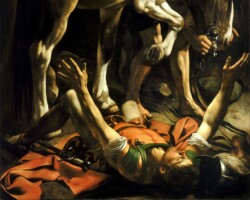Hope
 Definition and Explanation
Definition and Explanation
- Catechism of the Catholic Church, point 1817:
- "Hope is the theological virtue by which we desire the kingdom of heaven and eternal life as our happiness, placing our trust in Christ's promises and relying not on our own strength, but on the help of the grace of the Holy Spirit."
- Thomas Aquinas' Summa Theologiae, IIa.IIae, question 17:
- Hope is the virtue by which man attains proper measure in his deeds, hoping for a difficult but attainable good, attainable only through the help of God.
- The proper object of hope is eternal happiness.
Examples from Western History and Literature

Socrates' Apology
[Socrates:] “[A]ny man who has the spirit of philosophy, will be willing to die, but he will not tak…

St. Paul’s Hope
My eager expectation and hope is that I shall not be put to shame in any way, but that with all bold…

Entrance to Hell
THROUGH ME THE WAY INTO THE SUFFERING CITY, THROUGH ME THE WAY TO THE ETERNAL PAIN, THROUGH ME THE W…


